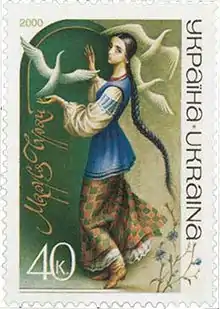Marusia Churai
Maria or Marusia Churai (1625–1653) was a mythical Ukrainian Baroque composer, poet, and singer. She became a recurrent motif in Ukrainian literature and the songs ascribed to her are widely performed in Ukraine.

According to the legend she was a native of Poltava (then in Crown of the Kingdom of Poland), and is regarded as the purported author as well as the subject of the well-known Ukrainian folk song "Oi Ne Khody Hrytsiu Tai na Vechornytsi" (Oh Gregory, Don't Go to the Evening Dances) known in the West as "Yes, My Darling Daughter".
In literature
The legend of Marusia Churai was formed under the influence of 19th century literary works such as the novel "Marusia, Malorosiiskaia Sapfo" (Marusia, the Littlerussian Sappho) by C. Shakhnovsky (1839). Many writers used the theme of "Hryts" in their works: M. Starytsky's play "Oi Ne Khody, Hrytsiu" (1892), V. Samiylenko's drama "Churaivna" (1894), Olha Kobylianska's novel "V Nediliu Rano Zillia Kopala" (She Gathered Herbs on Sunday Morning 1909), I. Mykytenko's drama "Marusia Churai" (1935), L. Kostenko's novel in verse "Marusia Churai" (1979), and others.
Influence in music
The song "Oi Ne Khody Hrytsiu" was translated into Polish (1820), Czech (1822), German (1827), French (1830), English (1848) and other languages. However its melody is not of folk origin. It was first documented use was as an arietta from a vaudeville by a Venetian composer Catterino Cavos.
The melody was used in Yes, My Darling Daughter, a 1941 song by Jack Lawrence.
Three other song texts that are ascribed to Marusia Churai: "Kotylysia Vozy z Hory" (The Wagons Were Rolling Downhill), "Viyut' Vitry" (Winds Are Blowing) and "Za Svit Staly Kozachenky" (The Kozaks Were Ready to March at Dawn). While the texts of these songs are of literary origin, their music is anonymous, from oral tradition. All the melodies that are attached to these texts date from the late 19th century. The text of the Ukrainian folk song "Oi ne khody Hrytsiu" was first published in English translation in London in 1816. A Polish translation first appeared in 1822 in Lviv and a German translation appeared in 1848. Evidence exists to the songs popularity in France (1830s), Czech, Slovak lands, Belgium and the United States where it equally well known was the song "Ikhav kozak za Dunai" (the Cossack rode beyond the Danube; music and words by Semen Klymovsky). {cn}
Marusia Churai was commemorated on a Ukrainian postage stamp in February 2000. {cn}
References
External linkis
- Marusia Churai in Encyclopedia of Ukraine (in English)